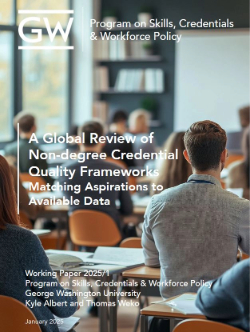Non-degree Credential Quality Project
New Working Paper (January 25, 2025)
A Global Review of Non-degree Credential Quality Frameworks: Matching Aspirations to Available Data Image

While non-degree credentials are growing in popularity throughout the world, there is significant variation between countries in how policymakers are ensuring that non-degree credentials meet the needs of working adult learners. This paper explores how national governments have adopted data collection on NDC labor market outcomes to match their own political and economic circumstances and how U.S. states have attempted to analyze credential quality data using their own credential of value frameworks. We evaluate how frameworks use existing data sources and identify additional sources of data that may need to be created to fully utilize quality frameworks. We also report on how U.S. higher education institutions are using data on non-degree credentials (credit-bearing and non-credit) to track learner outcomes and how much progress remains to be made to fully integrate non-credit and for-credit student record systems. Thanks to the Strada Foundation for supporting this research, and to UPCEA for facilitating a survey of its members.
|
Project Description
Non-degree credentials—those earned outside of traditional academic degree frameworks—play an increasingly key role in the education and training landscape. Recognizing their growing significance and considering persistent concerns about our inability to assess and communicate their quality, researchers and nongovernmental organizations have begun to formulate quality frameworks meant to guide those who provide non-degree credentials and learners who wish to earn them. Early efforts at quality frameworks have developed varied and thoughtful quality criteria. However, the architects of quality frameworks have struggled to outline how their criteria might be applied in practice—understandably so, since public data systems lag well behind non-degree innovations, and important parts of non-degree learning and credentialing are contained only within the record systems of learning providers that remain inaccessible to policymakers and researchers.
There is a large and diverse community of stakeholders who care about the quality non-degree credentials and stand to benefit from better information about their quality. This community includes learners themselves; the developers and providers of learning and credentialing, ranging from professional bodies to universities to learning platforms; educational technology firms; federal agencies and state governments; firms and industry associations; and accreditation bodies.
We aim to assist this community in advancing from the publication of nascent quality frameworks to their implementation and use. We begin by systematically comparing a range of proposed quality frameworks within (and outside) the United States. Our aim will be to identify a common core of widely shared quality criteria, and the logic that underpins them. Next, we will examine gaps between the conceptualization of quality and our capacity to measure and report on these criteria. Our focus will be to identify where and why these gaps exist, and what options are available for closing the measurement gap, both in the near and medium-term. The activity should help the credentialing community move from planning quality frameworks to the design and implementation of information systems that meet their diverse needs for better evidence about the widening scope of non-degree credentialing.

